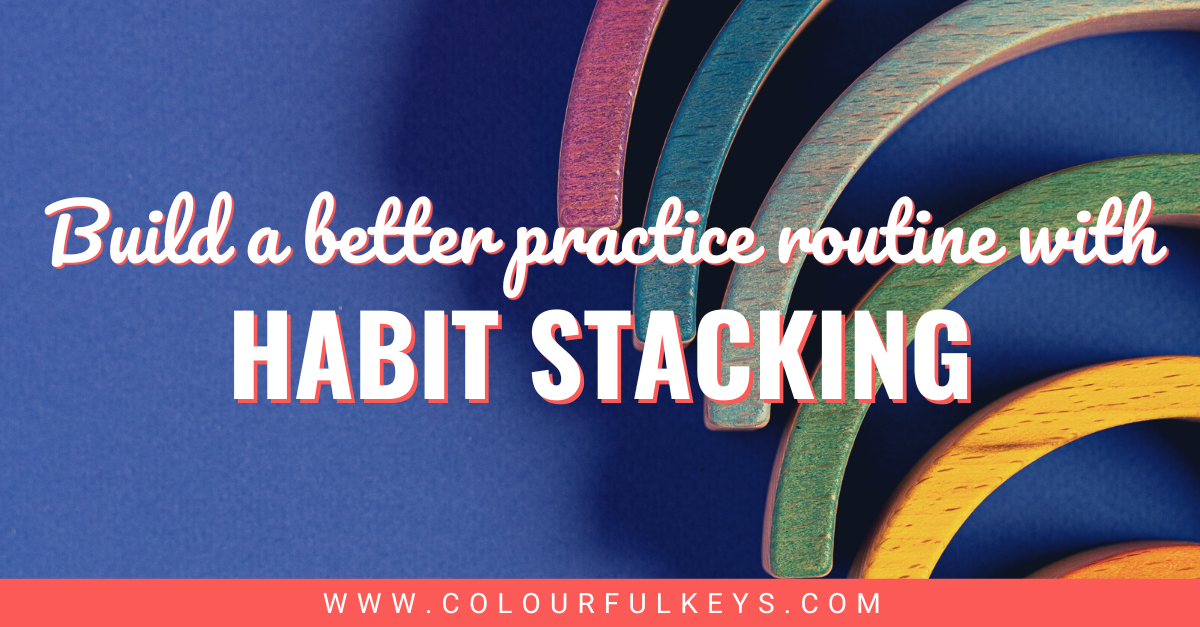Colourful Keys is primarily a blog for music teachers. However, this article is part of a series for PARENTS of music students. If you’re a music parent, read on to learn how “habit stacking” can help your child develop a regular practice habit. If you’re a teacher, feel free to pass the link to this article on to parents in your studio.
As a music parent, you’ve probably discovered that no amount of nagging, bribing or yelling will get a child to practise if they don’t want to. And even if you are able to get those unwilling musical offspring to practise, they certainly won’t be too happy about it.

It would be great if we could tell you well-intentioned piano parents that we’ve unlocked the secret to getting kids to practise – but we’d be lying. Years of experience have taught us that scolding, cajoling and holding the possibility of embarrassment over a student’s head is NOT the best way to get them to practise.
Luckily, we’ve discovered a super strategy that helps people form new habits. And many parents have adopted this approach with impressive results.
Habit Stacking
Have you read or heard of the book ‘Atomic Habits’ by James Clear? It’s an incredibly helpful take on developing habits that can aid you in tackling bad habits (like nail biting or unhealthy eating) and leading you toward creating new, better habits.
One of the best ideas from the book is the concept of “habit stacking”. (This piece of wisdom isn’t original to James Clear, though; BJ Fogg developed it as part of his ‘Tiny Habits’ program.)
The formula for habit stacking is something like this:
After [current habit], I will [new habit].
Sounds pretty easy, right? But, as you can imagine, it falls decidedly into the “easier said than done” category!
Clear reminds us that attaching the new habit to a previous, embedded habit is the key to making this method work. (We’d like to add that the current habit needs to be something your child actually does without any argument or nagging from you.)
Do This
The concept of habit stacking is relatively easy to grasp. Still, it’s a good idea to keep a few things in mind.
Attach Actions
Let’s assume your child has a habit of brushing their teeth. Since we’re hoping that’s the case, you can use that common routine as a prompt for practising.
If the timing of teeth brushing doesn’t work with practice time, try dinner or homework time. Try saying something like, “After dinner, practise the piano.” Or, “Once you’re done with homework, it’s time to practise.”
The key to habit stacking is to take something your child already does daily without much reminding, and attach music practice to that activity.
Create Prompts
How about using some sticky notes as cute reminders? Write, “First practise, then TV” and draw a happy face. Then smack that note on the TV. (This also works for the computer, iPad or gaming system.)

We’ve seen parents write prompts on memo paper and put them on the dinner table at their child’s place. You could copy this little idea by putting an “After breakfast, practise!” note on your child’s spot at the table.
If your child is a bit older and spends time at the mirror each day, give them a nudge by writing with a dry erase marker right on that reflective surface, “Once you’re done fixing your hair, it’s time to practise”. 🪞
Create a Chain
Once your child is comfortable stacking their music practice with, say, dinner, you can work with them to add more habits to create a chain of helpful habits. This new routine could go something like: dinner + piano practice + studying + story/TV time + teeth brushing + bed. (Notice the “reward” thrown in there, too.)
It’s usually best, however, to add just 1 or 2 things at a time to the established habit rather than try and force down a whole routine all at once.
Don’t Do This
As music teachers, we have a list of things we beg you NOT to do when developing the habit-stacking approach.
- Please do NOT attach practice directly to dreaded chores, or – even worse – make piano one of those chores. We never want music to be drudgery!
- Although video games or TV or some such may be a “habit” your child enjoys and engages in daily without any needling from you, please don’t attach practice to it or else practice will become the “bad guy” who interrupts their fun. Instead, use that hobby as a reward for going through the habit stack with a good attitude.
- Don’t give up if your child doesn’t immediately respond to the new music practice routine. As with any habit, it will take many, many attempts to ingrain this new norm.
Will you try “habit stacking” to help your child develop a music practice routine?
Feel free to leave your questions in the comments, and we’ll do our best to help.
For more like this, check out other articles from our “music parent” series:
- How involved should you be in your child’s music practice?
- Why NOT to Teach Your Child Music Staff Mnemonics
- Help Your Child Develop a Solid Music Practice Habit
- Is your child’s piano practice “right”?
- Why is my child’s piano teacher playing games in lessons?
- Why does my child have piano listening assignments?